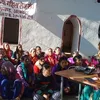This social enterprise is improving livelihoods and empowering women with clean-energy products
Pollinate Group is a social enterprise that aims to improve livelihoods and empower women in marginalised communities in India and Nepal.
According to World Bank estimates, about 288.5 million people in India and Nepal still live in poverty, earning a daily income of less than $1.9 per day. Most of them are concentrated in urban regions rather than in the rural populace.
Over the years, many cities in India have witnessed a rise in the number of marginalised communities due to people migrating from their villages in search of work. These communities then form semi-permanent urban housing with a makeshift tent in unfavourable conditions, void of water and electricity provisions.
Due to lack of opportunities, many are not unable to climb out of the poverty that they have been stuck in for generations.

Sujatha Ramani, CEO
Enter Pollinate Group that not only aims to tackle poverty, but also provides clean-energy based solutions to these communities as well as empower women to become entrepreneurs.
Founded in 2012, the social enterprise works on three UN SDGs – no poverty; gender equality; and affordable, reliable, sustainable, and modern energy for all – and aims to improve the livelihoods of marginalised communities and empower women in both India and Nepal.
An empowerment model
“We provide clean-energy solutions to these marginalised communities at flexible payment plans so that they can have off-the-grid access,” Sujatha Ramani, CEO of Pollinate Group tells SocialStory.
Many of these communities live under makeshift tents and shelters that are completely off the grid and use a kerosene lamp as the light source. The kerosene for the lamps costs them about Rs 10 every day, but in addition, they also utilise other plastics and waste to burn for light and cooking purposes.
The organisation provides clean energy products including solar lamps, clean cooking appliances, solar fans, solar torches, and other products that work off the grid, along with biodegradable sanitary napkins.

One of the women customers with a clean-energy lamp
The products range from Rs 1,000 to Rs 3,000, and last for about three to five years. They can be bought by these communities in instalments using flexible weekly payment plans.
“We noticed that women saved every penny by doing odd jobs to buy our products,” Sujatha adds.
So, instead of using their own sales agents, they realised that these women could sell the products to others in the community. Identifying women from marginalised communities not only allows them to become a leader in their community, but also gives them an opportunity to become an entrepreneur.
“These women needn’t have any kind of qualifications apart from having the passion to do the best with their life. We provide them with opportunities so that they can make a dignified livelihood, independently,” she shares.
The business model has a five-pronged empowerment strategy – empowering women, providing them with entrepreneurship opportunities, giving them access to clean-energy products, improve their living conditions with these products, and giving access to a dignified source of incomes.
“Once a woman sets up these products in her house, she can maintain the proof-of-concept and approach more customers,” says Sujatha.
The women who onboard are taught the necessary entrepreneurship skills for free. The enterprise provides the first lot inventory to these women worth Rs 5,000. She then sells the product within the community, keeps the margin for herself, and returns the cost price to the group.
Impact
So far, Pollinate Group has trained and skilled over 900 women to become entrepreneurs and reached almost seven lakh people with their clean energy products. They plan to reach at least 1,000 women by the end of 2021.
Manjula, an entrepreneur with the organisation, is now fondly known as Solar Manjula, or Manjula - the businesswoman, by her customers and friends.
"After receiving business skill training, there has been a considerable change in my own confidence. I have been working for years, but these skills have helped me gain so much more love and respect in my community, and even back in my native village. For me, this is bigger than the additional income I get from distributing clean energy products,” she says.

The women entrepreneurs of Pollinate Group
Lakshmi, an entrepreneur from Bengaluru has helped more than 500 families in her community gain access to electricity for the first time through clean energy products
She says, "When we live at the peripheries, every basic amenity is a privilege. But despite the pandemic, every house in my community had uninterrupted power through clean energy, and did not have to pay any bills."
“I could not have continued with construction work at this age. Thanks to the lights that Lakshmi has brought to us, I now have a small shop of my own. I am able to save since I do not have to spend anything on electricity bills or regular fuel. This has given me a chance to have a livelihood at this age, and not rely on anyone for my needs,” says Parvathi Amma, an elderly customer.
Going virtual with COVID-19
Pre-COVID-19, Pollinate had a team that would visit these women and teach them about the different products and how to market them. But during the pandemic, the team went online and took to a learning management system (LMS).
This LMS is available in different languages including Hindi, Kannada, Telugu, Nepali, and Bengali, and caters to women in Bengaluru, Tumkur, Hyderabad, Lucknow, Kanpur, and Kolkata in India, and Chitwan, Kailali and Bardiya in Nepal.

The team
“While earning an income has become a challenge for these families, the initiative has allowed these women to become the breadwinners of their family,” says Sujatha.
The enterprise is funded by CSR initiatives and philanthropic activities. The major areas of cost are those teams involved on the field in training the women. But once women can cover a bigger inventory, it becomes easier to scale in terms of growth, says Sujatha.
Talking about the road ahead, Sujatha says, “By 2025, we want to work with 10,000 women, and impact about 10 million lives with access to clean energy and have provided about 1.5 million clean-energy products.”
Edited by Kanishk Singh








